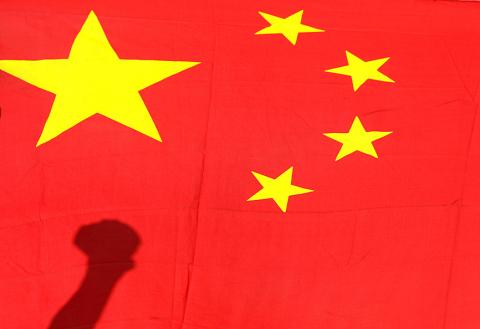Protests against Japan broke out in more than a dozen Chinese cities, including Beijing, yesterday, as authorities allowed thousands of people to vent their anger over an escalating territorial row.
The demonstrations — which saw Japanese businesses, restaurants and cars targeted in some cities — erupted after Japanese nationalists landed on an island claimed by both countries.
The latest anti-Japan protests are believed to be the most widespread in China since 2005, when several cities saw demonstrations over a slew of grievances, including Japan’s wartime atrocities.

Photo: Reuters
In Shenzhen, protesters waved Chinese flags and shouted slogans as they marched on major streets, with the numbers swelling to about 1,000, Xinhua news agency said. Protesters overturned a police car that was made in Japan and damaged a Japanese restaurant, it said.
Zhang Pei, one of the participants, said protesters were marching toward the train station on the border with Hong Kong.
“The demonstration is strung out for 7 to 8km. Many police are escorting us along the street,” he said by telephone.
Protests are usually swiftly put down in China, but one analyst said the government had an interest in allowing them to go ahead, for a time.
“They’re using the popular card to put pressure on Japan,” said Willy Lam (林和立), a China expert at the Chinese University of Hong Kong. “The [Chinese Communist] Party leadership realizes nationalism is a double-edged sword. If they see a possibility of the protests escalating, they will give the signals to put an end to this.”
More than 100 people gathered near a complex housing the Japanese consulate in Guangzhou, chanting: “Japan get out of the Diaoyu Islands,” Xinhua reported.
China — which yesterday lodged a “strong protest” with Tokyo — calls the archipelago the Diaoyutai Islands (釣魚台), but it is controlled by Japan, which calls it the Senkaku Islands.
Witnesses said demonstrations also took place in Shanghai and Chengdu, where protests shut down a Japanese department store and a branch of the Japanese clothing store Uniqlo.
Anti-Japan protests also occurred in Qingdao, on the east coast, as well as in Shenyang and Harbin.

MAKING WAVES: China’s maritime militia could become a nontraditional threat in war, clogging up shipping lanes to prevent US or Japanese intervention, a report said About 1,900 Chinese ships flying flags of convenience and fishing vessels that participated in China’s military exercises around Taiwan last month and in January last year have been listed for monitoring, Coast Guard Administration (CGA) Deputy Director-General Hsieh Ching-chin (謝慶欽) said yesterday. Following amendments to the Commercial Port Act (商港法) and the Law of Ships (船舶法) last month, the CGA can designate possible berthing areas or deny ports of call for vessels suspected of loitering around areas where undersea cables can be accessed, Oceans Affairs Council Minister Kuan Bi-ling (管碧玲) said. The list of suspected ships, originally 300, had risen to about

DAREDEVIL: Honnold said it had always been a dream of his to climb Taipei 101, while a Netflix producer said the skyscraper was ‘a real icon of this country’ US climber Alex Honnold yesterday took on Taiwan’s tallest building, becoming the first person to scale Taipei 101 without a rope, harness or safety net. Hundreds of spectators gathered at the base of the 101-story skyscraper to watch Honnold, 40, embark on his daredevil feat, which was also broadcast live on Netflix. Dressed in a red T-shirt and yellow custom-made climbing shoes, Honnold swiftly moved up the southeast face of the glass and steel building. At one point, he stepped onto a platform midway up to wave down at fans and onlookers who were taking photos. People watching from inside

Japan’s strategic alliance with the US would collapse if Tokyo were to turn away from a conflict in Taiwan, Japanese Prime Minister Sanae Takaichi said yesterday, but distanced herself from previous comments that suggested a possible military response in such an event. Takaichi expressed her latest views on a nationally broadcast TV program late on Monday, where an opposition party leader criticized her for igniting tensions with China with the earlier remarks. Ties between Japan and China have sunk to the worst level in years after Takaichi said in November that a hypothetical Chinese attack on Taiwan could bring about a Japanese

STREAMLINED: The dedicated funding would allow the US to transfer equipment to Taiwan when needed and order upgraded replacements for stockpiles, a source said The US House of Representatives on Thursday passed a defense appropriations bill totaling US$838.7 billion, of which US$1 billion is to be allocated to reinforcing security cooperation with Taiwan and US$150 million to replace defense articles provided to the nation. These are part of the Consolidated Appropriation Act, which the US House yesterday passed with 341 votes in favor and 88 against. The act must be passed by the US Senate before Friday next week to avoid another government shutdown. The US House Committee on Appropriations on Monday unveiled the act, saying that it allocates US$1 billion for the Taiwan Security Cooperation Initiative